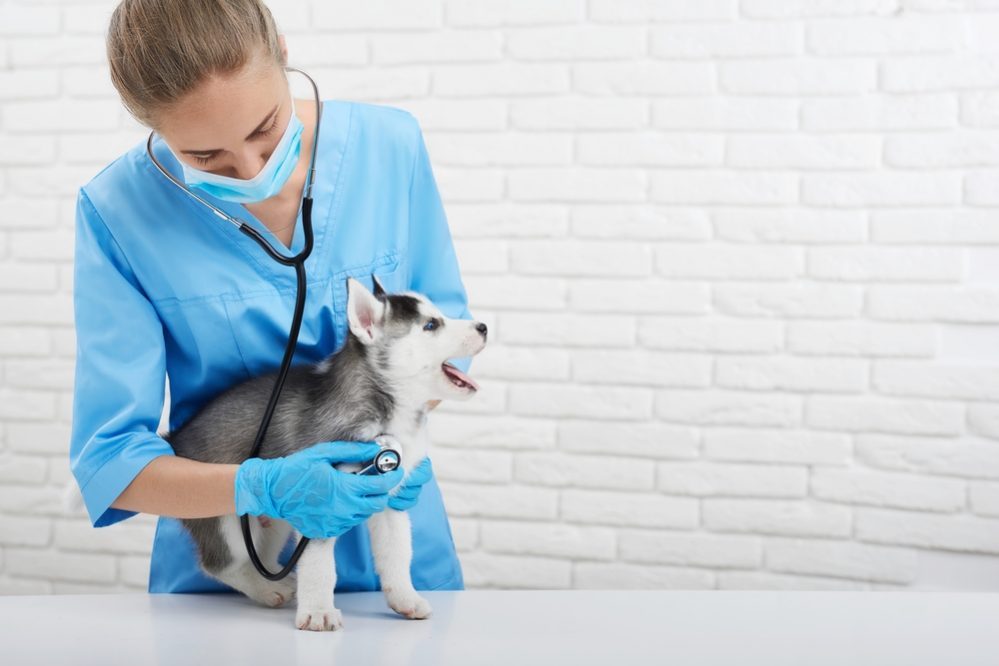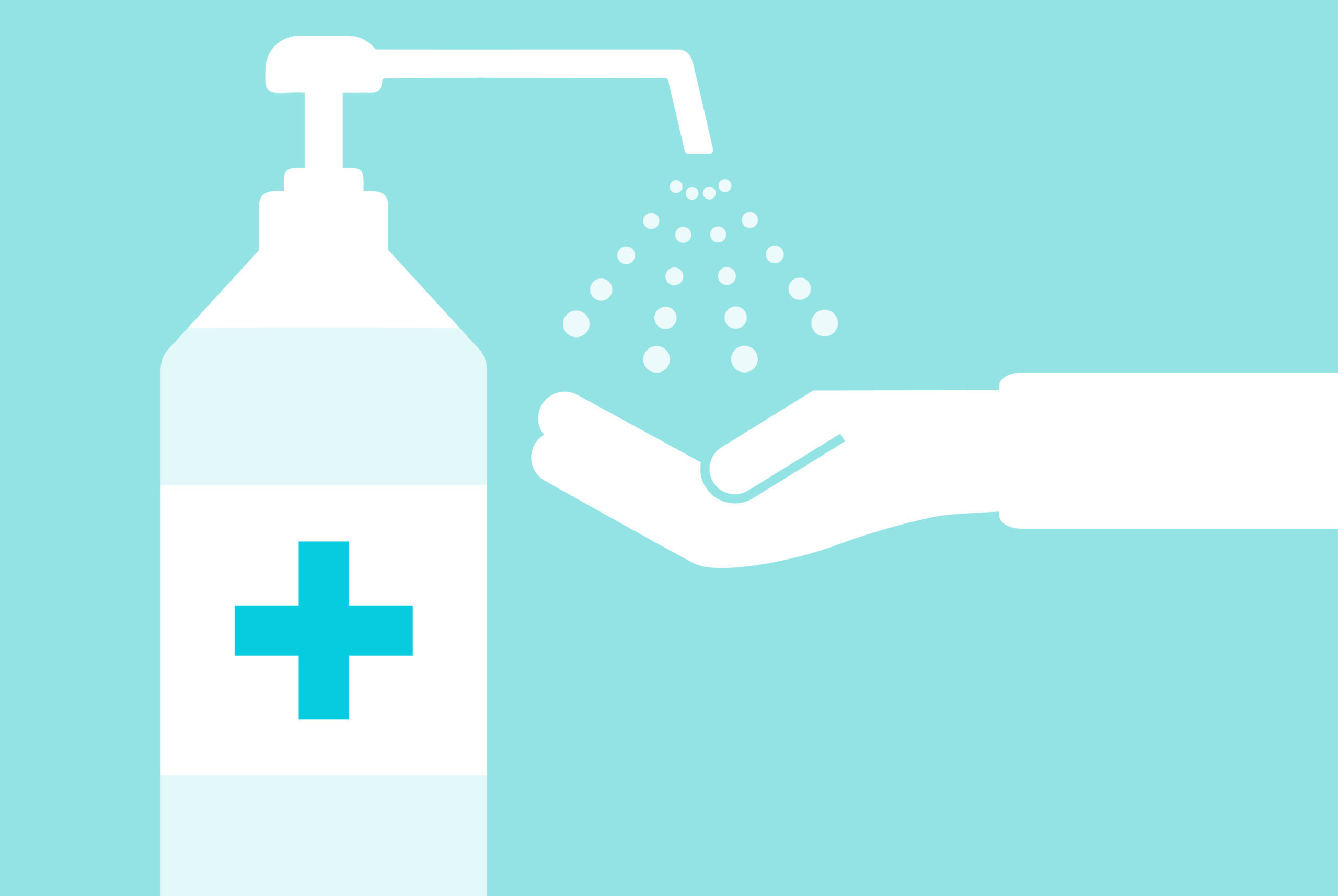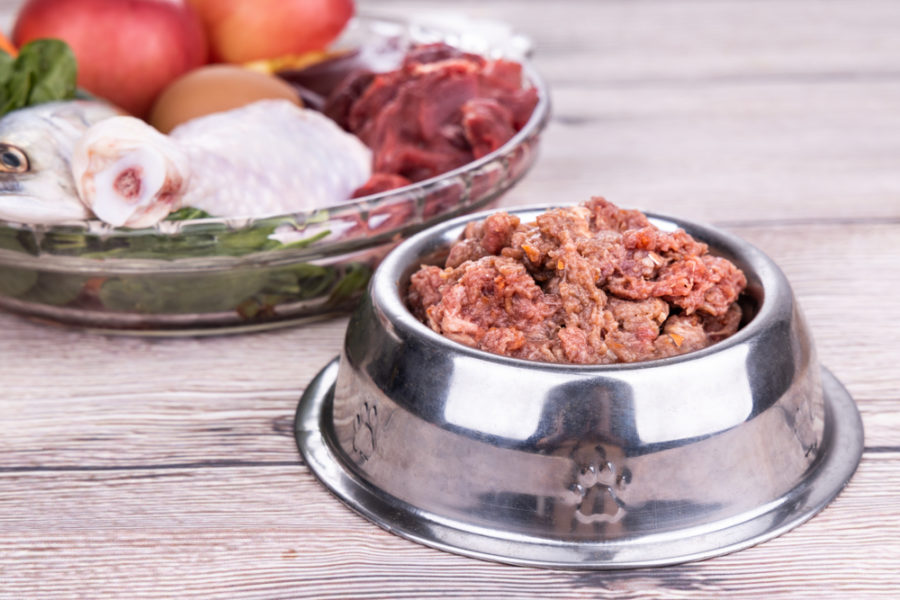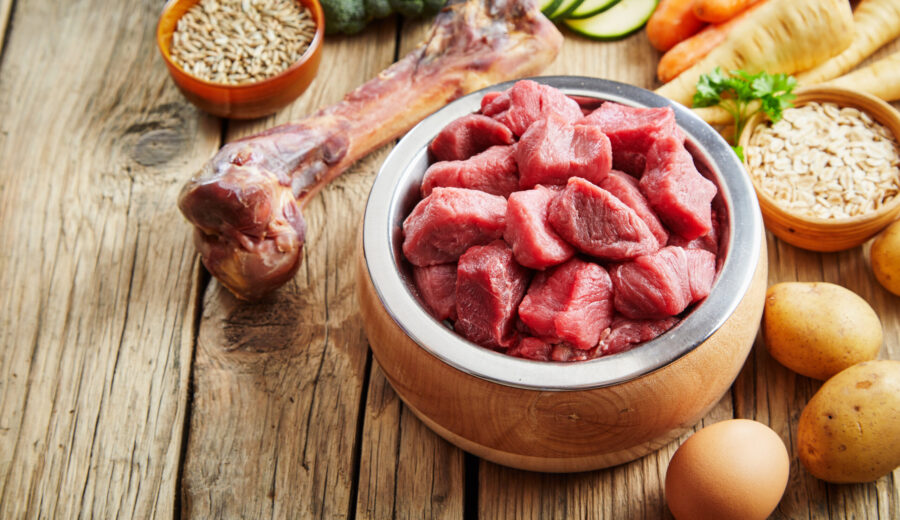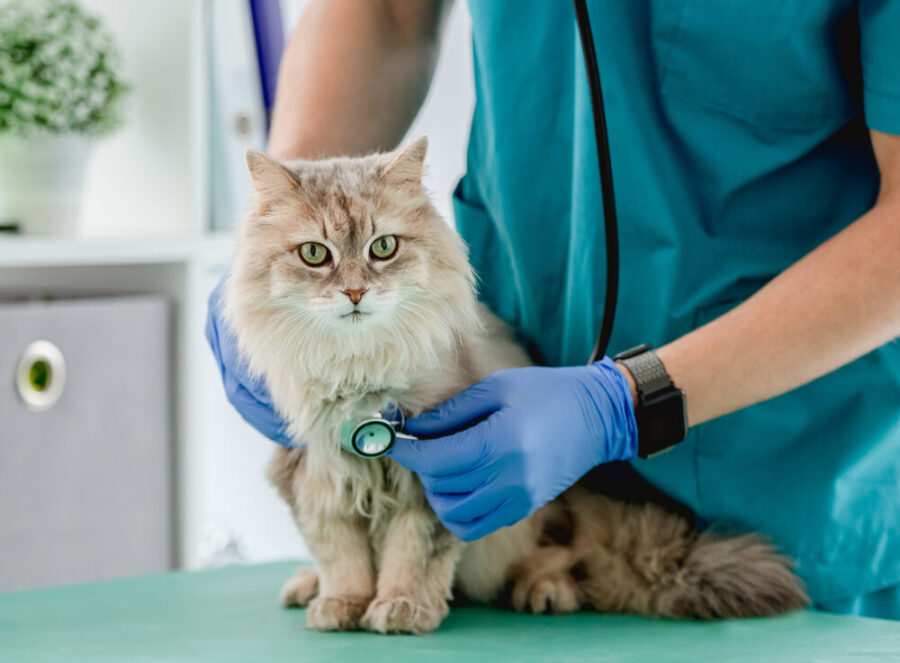If you’ve just adopted a puppy, one of your first priorities is to take him to the vet for a checkup. Here are 8 important considerations you need to think about to prepare for that first visit and get him off on the right foot.
You’ve just adopted a puppy from a rescue or shelter. One of the first things you need to do is to take him to a veterinarian – ideally, an integrative or holistic vet – to have him checked over. With a little education, you can approach your vet with a plan for your pup, and work together to ensure he grows up healthy and happy. Here are eight considerations you need to factor into your plan.
1. Nutrition
Ask your vet about the best nutrition for your pup. I am a fan of species-appropriate diets. This means a variety of fresh, meat-based, prey-concept foods. In nature, a pup is weaned from Mom and then onto critters like mice and rabbits. with some bone-chewing and foraging. I counsel my clients to mimic this as closely as possible, ideally with home-prepared or commercial raw diets. Prey is never cooked, but it is warm. Do not feed cold food; this damages stomach “yin”.
Be sure the calcium:phosphorous ratio of the diet is balanced. You will need to ask the pet food manufacturer, as this is normally not stated on the label. Too much calcium can cause bony growth abnormalities. Do not add extra calcium to an already “balanced” diet.
My best advice is to feed a variety of fresh menu items. You will create a strong gut and immune system and you avoid the risk of an excess or deficiency, which can occur when the same inadequate diet is fed day after day.
What about supplementation?
A whole food supplement is also a great idea. This allows the body to recognize and utilize what it needs and eliminate what it does not. Many vitamins and minerals are found in plants. You can “pre-digest” by warming and blending organic spring mixes which contain superfoods such as kale or herbs such as dandelion greens. Even a ¼ teaspoon of this type of mixture provides a lot of nutrients and moves digestion in a puppy. Start slow.
There are also many commercial whole food supplements. The “ingredient” panel should include foods you recognize, while the “analysis” panel should include a measured list of vitamins and minerals.
2. Lifestyle and training
A huge percentage of dogs are relinquished by their owners due to behavioral problems. Dogs need exercise and emotional stimulation. Many need an actual “job”. Think about this need before you adopt your puppy. Ask your vet for recommendations of local qualified trainers and fitness facilities.
3. Grooming
Some dogs require very little bathing and grooming, while others suffer miserably when this aspect of their care is neglected. Whether you choose a groomer or bathe your puppy by yourself, begin slowly and gently at a young age and use toxin-free products. A “perfumey” fragrance is a warning sign. Read labels for recognizable healthful ingredients. Your puppy absorbs toxins through the skin, and skin sensitivities are far too common. A holistic or integrative vet can help you pick good products or steer you to a natural groomer.
4. Vaccination/titer testing/nosodes
Most puppies receive their first vaccinations at eight weeks and again at 12 weeks. Ask for only the “core” vaccines — distemper, parvovirus, adenovirus (hepatitis) and rabies.
Homeopathic nosodes may also be considered. This is a great concept and very safe, but studies unfortunately do not demonstrate effectiveness.
Consider your dog’s lifestyle and risk. Remember, vaccination does not make one healthy; it only attempts to protect should the individual be exposed to that particular disease. Some pups do not mount a protective immune response, so ask for a titer test; the best time to check is at 18 to 20 weeks. You could conceivably check multiple times at a younger age if you are trying to give the fewest vaccinations possible, but you need to work with a holistic vet who understands the advantages and limitations of titer testing.
Remember, vaccination does not make one healthy; it only attempts to protect should the individual be exposed to that particular disease.
5. Deworming
Most puppies are born with roundworms. This is because these internal parasites have figured out how to go into dormancy inside an adult female dog, and then release a stage of parasite into the pup via placenta or colostrum (mother’s first milk). Pyrantel pamoate is a mild conventional dewormer. Natural approaches can be also used and include things like pumpkin seeds or diatomaceous earth. Some of these approaches can be irritating to the GI tract, however, so get guidance from your vet.
It is common to get a false negative fecal in puppies when checked prior to 12 weeks. Multiple dewormings are needed to clear all the stages, or symptoms will occur from inadequate deworming.
 6. Heartworm prevention
6. Heartworm prevention
A heartworm protocol varies with lifestyle and location. Depending on where you live, your pup may not be at risk and you might be able to avoid this entirely. Your vet can let you know what your pup’s real risk is.
It is helpful to understand how the “preventative” works in order to make an informed decision. Heartworm comes from mosquitoes, not fecal contamination or contact with another dog. Conventional ivermectin or milbemycin products work as dewormers, removing larval stages before they develop into adult worms in the heart. This means they work “backwards”. For example, if you live in an area where mosquitoes don’t come out until June, then it is not necessary to begin heartworm preventative in March, nor to give it year round. An early July administration of the medication will take care of June. In fact, these products technically work backwards 45 days.
These medications can cause liver enzyme elevations on blood tests. They may also contain “food” ingredients in the chew or tableting agent which may be allergenic or otherwise detrimental. One product contains propylene glycol, wheat gluten, soy, onion powder, beef flavor and other questionable ingredients. Keep this in mind when you are looking for a hidden cause of gastrointestinal (GI) or skin disease.
Unfortunately, natural GI deworming approaches are not effective against this blood-borne parasite, although a strong immune system can be preventive. Try to keep medications to a minimum, while carefully considering your dog’s risk of contracting heartworm.
7. Flea and tick control
Conventional spot-ons are commonly used for flea and tick prevention. These can be toxic and ineffective. Some cause significant local reactions, soreness or hair loss at the site of application. Others contain known carcinogens. These pesticides get into the blood stream and lipid layer of your pup and accumulate over time. Again, it is best to create a healthy immune system in your pup, which will make him naturally resistant – an integrative or holistic vet will work with you on this. You can also give him foods that make the body objectionable to parasites, such as garlic and brewer’s yeast. I am a fan of safe and effective essential oils. There are blends that can be sprayed onto the dog’s coat on a regular basis.
8. Spay/neuter
Most veterinarians still recommend spaying your female dog, or neutering your male dog at six months of age. Again, do your research and talk to your vet about some newer alternatives. I have never supported young age altering, and retrospective studies are now showing that the loss of hormonal influence at an age of ten or 12 weeks is detrimental. You may want to wait until growth plates are closed before performing these surgeries. Also consider allowing your female to have one heat cycle. You might also consider a hysterectomy rather than an ovariohysterectomy. Large breed male dogs who are left intact have a decreased incidence of bone cancer.
You have a lot of decisions to make for your puppy. Do your research, plan ahead, and don’t be afraid to ask your vet questions. Forming a strong working relationship with your vet is one of the best ways to ensure a healthy dog.

